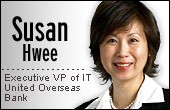Managing UOB's critical IT pipes

 |
Indeed, there is hardly a dull moment at work as her responsibilities and priorities range from implementing core banking systems and ensuring the availability of round-the-clock Internet banking services, to reengineering back-office operations and keeping up the morale of her IT department.
Hwee, who is the executive vice president of IT at United Overseas Bank (UOB), manages the IT functions of the Singapore-based bank, which aims to be a premier bank in the Asia-Pacific region with 40 percent of its total profit generated outside of the island-state by 2010.
As head of IT, Hwee remains ever watchful over the bank's IT operations and ensures that the bank continuously innovates, while striking a balance between investment and cost management.
In an exclusive e-mail interview with ZDNet Asia, Hwee talks about the importance of business agility and shares the bank's IT priorities for 2007.
Q. A bank is really one that never sleeps, especially now with the availability of Internet banking services. How much tougher has that made life for you?
Hwee: Offering round-the-clock services is a global trend, more so in this competitive and dynamic industry. Hence, we must be on our toes at all times to stay on course. To keep close pace with our competitors, we have to be watchful over their moves and respond nimbly to changes in the market and economy. Innovative products and services are our metaphorical sprints or leapfrogs.
Therefore, we cannot afford to be complacent. On good days, we must plan for the unexpected. For example, we strengthen corporate governance and benchmark ourselves against good market practices to ensure resilience during market downturns and adversities, as well as to challenge ourselves to outperform.
Name |
Can you share with us what goes on behind the scenes, in your IT department, that ensures everything works like clockwork every day?
Over the years, significant investments have been made in building up a proven and mature operating base in Singapore. Examples include investments in customer management capabilities to leverage on enlarged customer franchise, the re-engineering of back-office processes for more straight-through processing, the revamp of credit management processes and engines, and the creation of regional data storage and decision-support engines to support the business.
Our strategy is to leverage and make this our shared regional facility or regional factories for our regional business' IT and back-office operations. By creating centers of excellence in Singapore, we are able to bring about scale, expertise, product variety and high service standards to our target markets. In addition, we also constantly benchmark our operating capabilities in our quest for service excellence.
What are your IT priorities for 2007, and how are they different from last year's?
Last year, our IT focus was on regulatory compliance such as Basel II and two-factor authentication for Internet banking, business continuity planning such as in-house cheque clearing and archival of imaged documents that are admissible in court, as well as other business initiatives to support business operations such as straight-through processing for treasury securities.
This year, against a backdrop of stronger positive global economic outlook and increased competition, some of UOB's IT priorities are to enable business strategies for private banking, optimize and personalize self-service channels, and to implement straight-through processing for treasury derivatives. At the same time, we are stepping up on more stringent customer due diligence measures by building compliance for anti-money laundering into our systems.
Our focus for the regional franchise remains the same for Thailand and Indonesia, which is to transform our regional subsidiaries by leveraging tested business models, operating and delivery excellence, that are enabled through common systems. The difference in 2007 is the addition of China to the list of overseas subsidiaries, where we'll be implementing common core processing and infrastructure. This will take place simultaneously with the local incorporation of our seven China branches into a single bank entity so that as a foreign bank, we can offer a wider range of Yuan-denominated services.
As a regional center, we are also upgrading our disaster recovery capabilities. The investment will further improve our scale, enhance risk management and overall IT infrastructure and operational efficiency for the UOB Group, as we continue to roll out tested models across the region.
Banks and credit card companies get flak for not doing a good job putting together a 360-degree view of their customers. What's your view on this?
Yes, it is important for banks and credit card companies that are serious about the business to know their customers. IT is only one of the enablers.
In UOB, we have a comprehensive customer relationship management (CRM) system in place. With this, the organization can have a complete picture of all aspects of a customer's relationship with the business across all channels, including his interaction history and level of service received. A CRM system also facilitates seamless follow-up of service requests and the provision of better service by frontline personnel. The end-result is a consistent, positive and satisfying experience for customers.
JW Marriot Jr., chairman and president of hotel chain Marriot, once said: 'The competitive edge in any service business is people. People make or break quality.' Hence, of equal importance, if not more, is the organization's service mindset, service values, service attributes and service standards. Customers' perception depends on what impression we create in every customer contact moment. These are the moments of truth that are sometimes beyond what a 360-degree view can offer.
What keeps you awake at night?
A few months ago, the team was under pressure to deliver regional systems standardization projects in Thailand and Indonesia. The projects were very intensive due to the scale, and there was at least one important implementation every other week. I was concerned about the well-being of my team. They delivered well, despite the challenging deadlines. I am glad that that is over now.
Having said that, there are always new challenges on the work front and these keep my adrenaline level going.